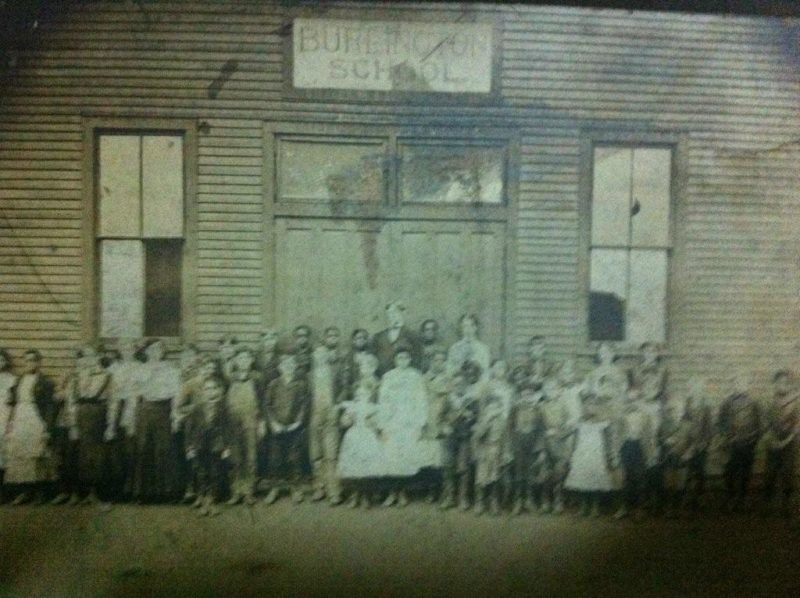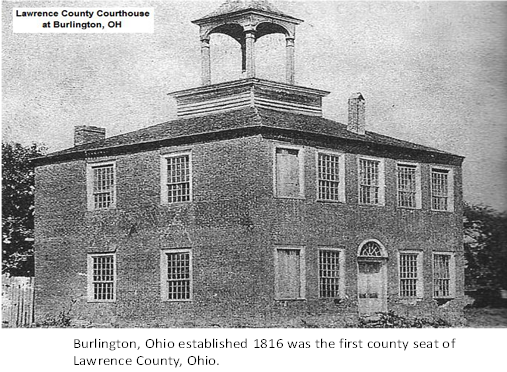Reminiscences of Burlington, Ohio – Events and Persons at Lawrence County, Ohio’s Former Capital
A Talk with One of the Old Citizens
Ironton Register, 11 Jul 1895
The town of Burlington, the old county seat of Lawrence County, was laid out and sold by Edward W. Tupper, of Gallipolis, on the 20h of February 1818, he was appointed director by the authorities at Columbus, for that purpose. Lawrence County, Ohio, was created on December 20, 1816, from Gallia County and a small part of Scioto County, Ohio, and was organized on March 24, 1817.
The town was originally located on the lands now owned by John Ferguson and Wm. Elkins, and was owned at that time by E. B. Greene, now known as the Delta, the school house and church of that name being on or nearby the same land.
Early Burlington, Ohio School, photo courtesy of the late Dave Milem
The town of Burlington, the old count seat of Lawrence County, Ohio, was laid out and sold by Edward W. Tupper, of Gallipolis, on the 20th of February in 1818. He was appointed Director by the authorities at Columbus, Ohio, for that purpose.
The town was originally located on the lands now owned by John Ferguson and William Elkins and was owned by E. B. Greene, now known as the Delta, the schoolhouse and church of that name being on or nearby some land.
There were several log cabins erected, but the question of title arose, and upon examination, they concluded to move their location and selected the present site; John Davidson and William Burton each gave 25 acres of land, in all 50 acres, which now composes the present town of Burlington. Several of the houses which had been built on the Delta lands were torn down and hauled to and erected at the new place, which was named Burlington for a town in Burlington, Vermont.
The first Court was held in a log house, and a log jail was built, which burned down about the year 1847, having been set on fire by a colored man confined there, charged with incest. The first house built in the new town was by Wm. Burton, father of Stephen Burton, who lives here and has been a citizen of this place all his life, and to whom I am indebted for some of this history.
There was a man living here before the town was laid out by the name of Baird, pronounced by the natives as spelled Beard, who traded with the Indians, sold them guns, ammunition, trinkets, &c., and worst of all ‘Firewater’, as the red men called whiskey. He accumulated quite a fortune, died very suddenly, was supposed to have been poisoned, and the house, which was afterward converted into a hotel, had the reputation of being haunted.
John Davidson is one of those who gave half of the land which composes the town and was the father of James, Joseph, and Wm. Davidson, all of whom have passed and the grandfather of Maj. Jerry Davidson, of your place. When I was quite a lad, my father pointed out to me a fallen trunk of a tree, on which Jno. Davidson killed a panther a few years before, and it was considered then something of a feat, as the wild game was beginning to get scarce. The tree was just back of town, at the foot of the hill, on the old Jackson road.
My first recollections of the Courts held in Burlington, some 50 years ago, (in the old Court House, which is now torn down, having been damaged so much by the frequent explosions of the Powder Mills just across the river, as to make it unsafe) was the fact of there being three judges, one Superior and two Associate. The Superior Judge was elected and the Associates were, I believe, appointed, although I am not sure. They, the Associate Judges, were generally the best-educated men of the neighborhood, such as Greene, Scoville, Johnson, and others whom I have forgotten. Court day, as it was termed, was an event, that stirred the county from center to circumference.
For two to four weeks, the village was thronged with people, and the three hotels, which the town boasted of, were packed full. The Harrison hotel, a brick building on the northwest corner of the public square kept at the time I speak of by David Henshaw, father-in-law of Col. E. Nigh, of your city was considered the most aristocratic, and the judges, lawyers, and furnace magnates were its patrons. The other one, Number 2, was on the southeast corner of the square and was kept by Thomas Clark, the brother of D.H. Clark and the son of Columbus B. and Sarah Kouns Clark.
His patrons were the best farmers and the clerks of the different offices and stores. The third, was up on Washington Street the main street of the town, which was also the entrance of the town from the county road, called the White Hall, was quite a large building and was patronized largely by boatmen. It was kept by Dr. O. D. Owen and he had a large custom. As almost all kept liquors of all kinds, Burlington at times was a very lively place. The Harrison hotel is the only one left, kept now by the heirs of John Dillon. Of the others, the White Hall burned down many years ago and the other I purchased and had torn down.
What times we boys had during Court week, watching the proceedings – interested and taking sides in every trial, exalted when our side won and based when we lost! With what wonder and awe did we look on the Superior Judge, W. V. Peck, who was afterward made Supreme Judge and I recollect to this day how said felt when he sentenced one of our township boys, Washington Wilmore, to the penitentiary for twelve years of hard labor, and my youthful mind could hardly grasp the awfulness of being shut up in prison for that length of time.
Burlington was a noted place when in the campaign of 1844, the Whig candidate, Henry Clay was pitted against the democratic candidate, James K. Polk. Clay was the idol of his party and his defeat was almost a Waterloo to them. My earliest recollections were about the rival poles. The Whis had erected one which cost them $100. It was a beautiful pole 100 feet high surmounted by a large tin ball and a scaffold was built on it about 20 feet from the ground for the speakers to occupy.
I was about seven years old and my memory of the events that occurred is very vivid. A gentleman up from Big Sandy, had given me a stuffed coon which the Whigs nailed to their pole and I was in a dilemma by my love for the party and my love for the coon, what was I to do? However, it was solved by a man named Crumish giving me one dollar for the coon, so the pole got the coon and I got the dollar an example of how patriotism and lucre can be combined.
The Democrat had their pole, which was tall, straight hickory, surrounded by an old-fashioned split hickory broom imitating that they would sweep everything before them – a true symbol for they did of Messenier. Hurrahed for “Petticoat Allen,” a nickname given Allen during the Harrison campaign. The Democrats ran Messenier clear out of town and it would have been sore bones for him if he had been caught. There were torchlight processions, using candles or pitch pine from the forest.
Fife and drum were the music and Uncle Joe Davidson of South Point, Duncan and Samuel McKee of Salliday [sic] Cree. Washington Kerr and William McClure of the town were the musicians and how we boys would stand around and help cheer when our candidate’s name was mentioned.
My father who was a merchant had just arrived with new goods from Philadelphia and had brought with him blue ribbon sashes for the Whig girls, on which was printed Henry Clay and Theodore Frelinghuysen and the Whigs girls sang:
“Hurrah, hurrah, the day is rising,
For Henry Clay and Frelinghuysen.”
John G. Wilson



0 Comments